【2015中考复习方案】(冀教版·河北)2015届九年级英语复习课件(自学反馈+重点突破):第10课时 Units 3—4 [八年级下册](共34张PPT)
文档属性
| 名称 | 【2015中考复习方案】(冀教版·河北)2015届九年级英语复习课件(自学反馈+重点突破):第10课时 Units 3—4 [八年级下册](共34张PPT) | 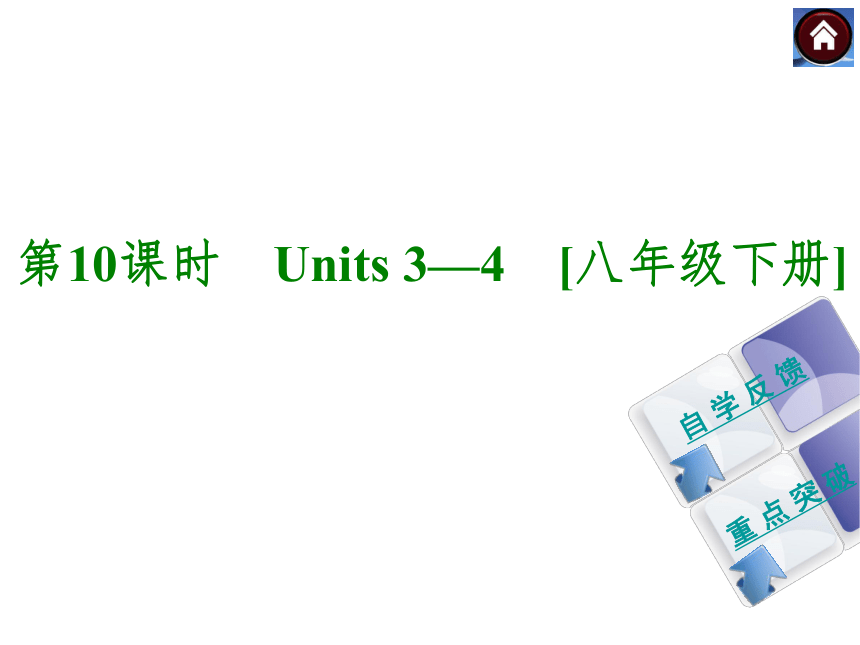 | |
| 格式 | zip | ||
| 文件大小 | 462.8KB | ||
| 资源类型 | 教案 | ||
| 版本资源 | 冀教版 | ||
| 科目 | 英语 | ||
| 更新时间 | 2015-01-17 17:58:55 | ||
图片预览

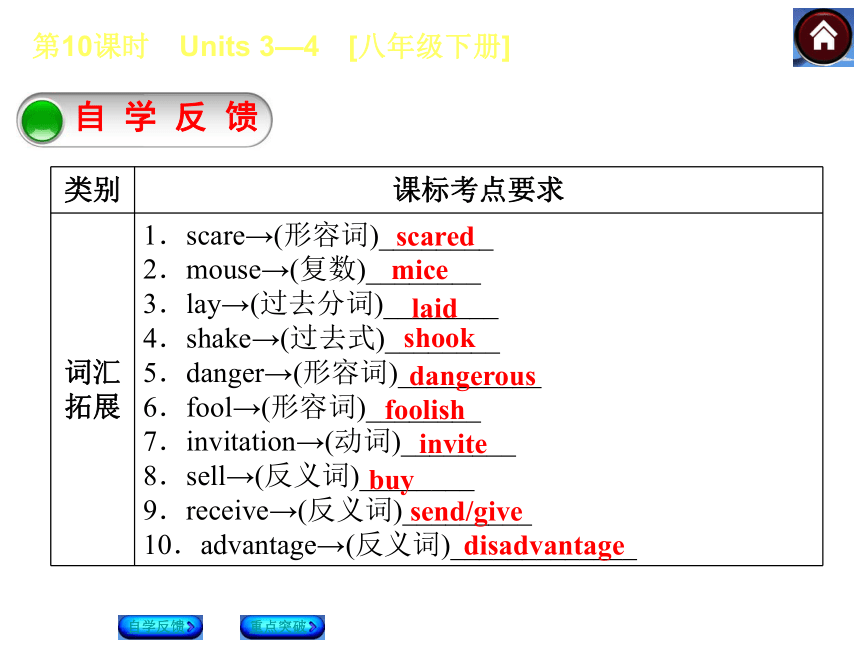
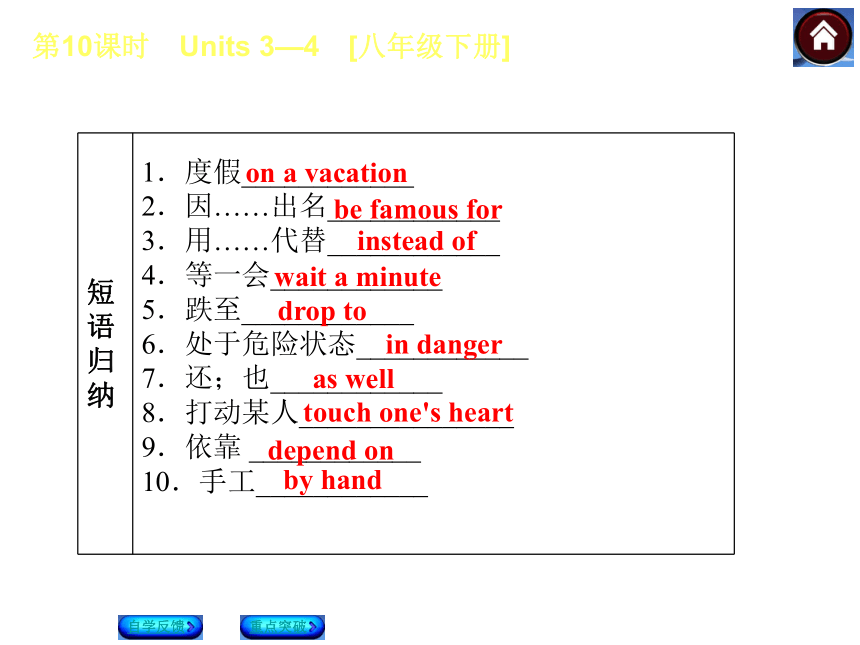
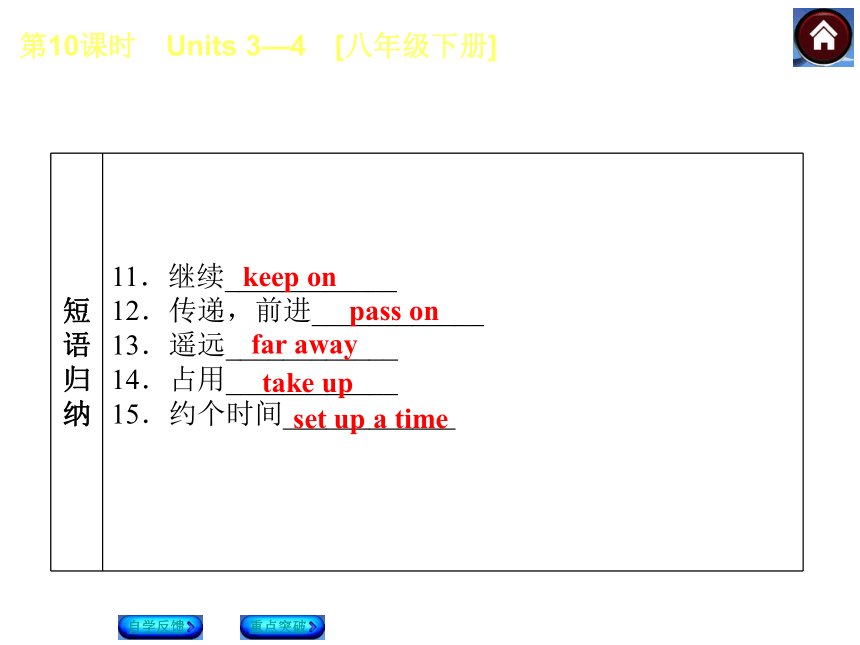
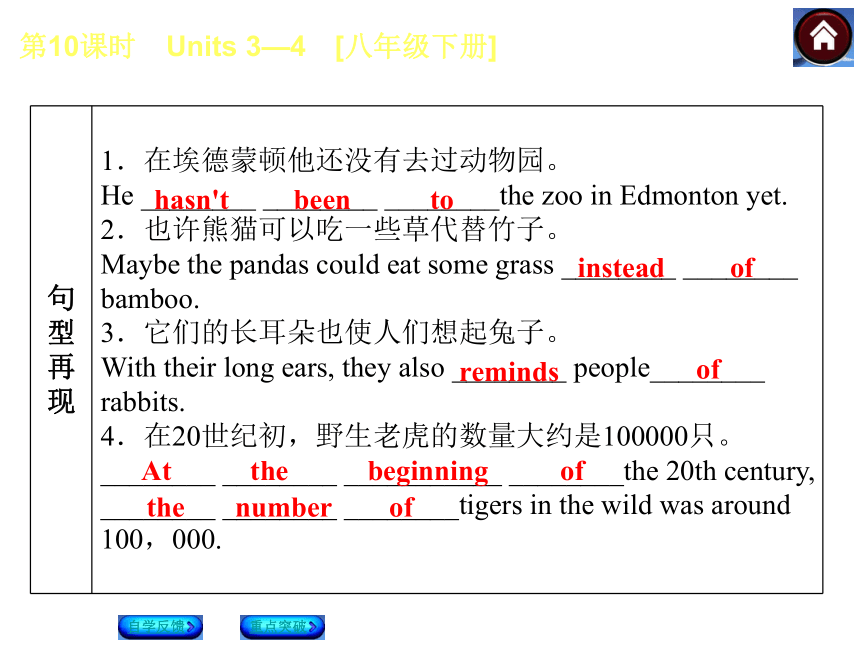
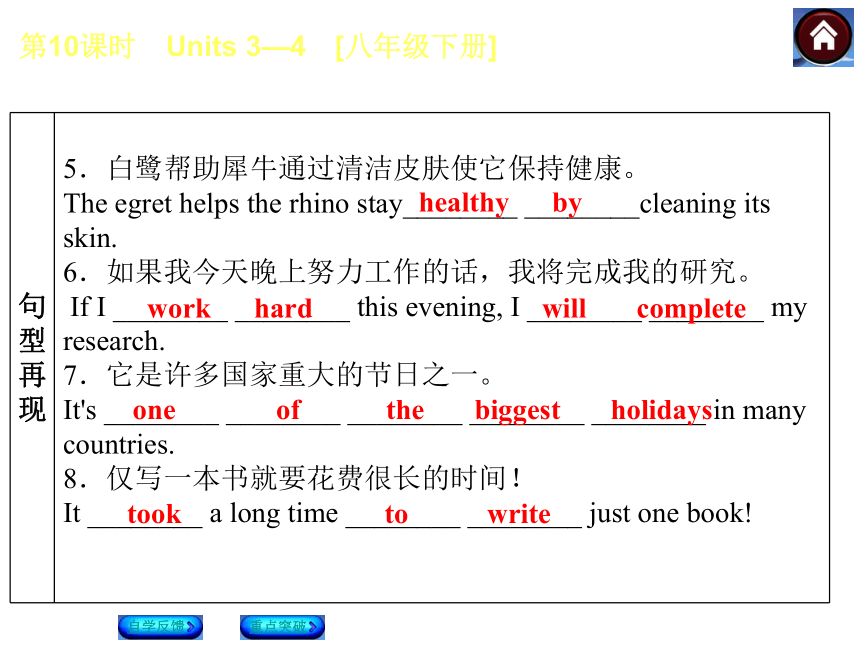
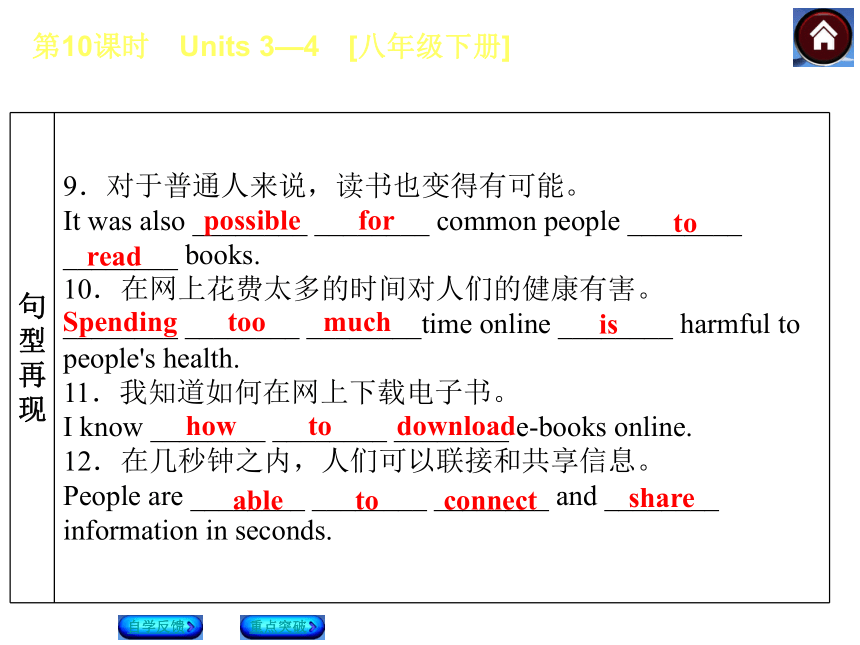
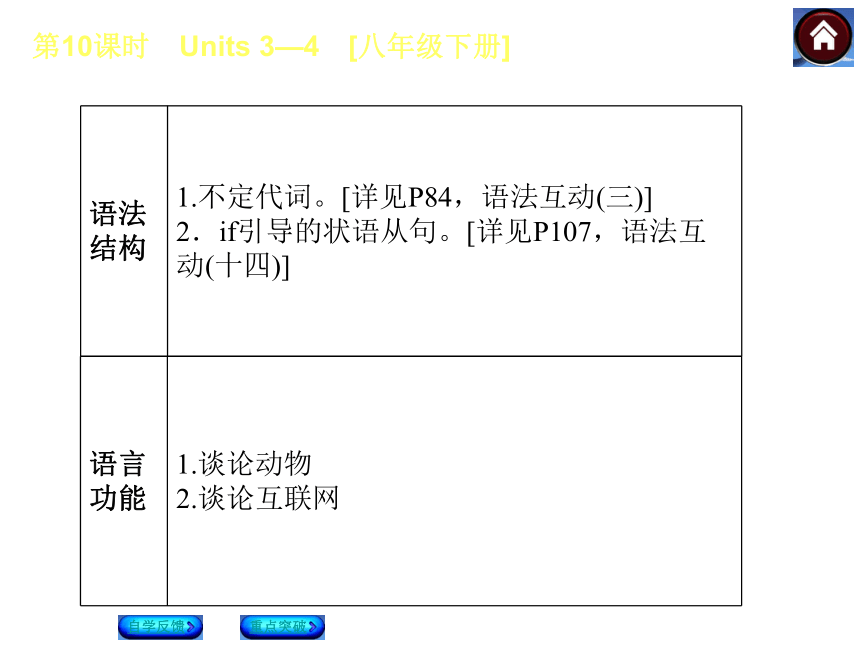
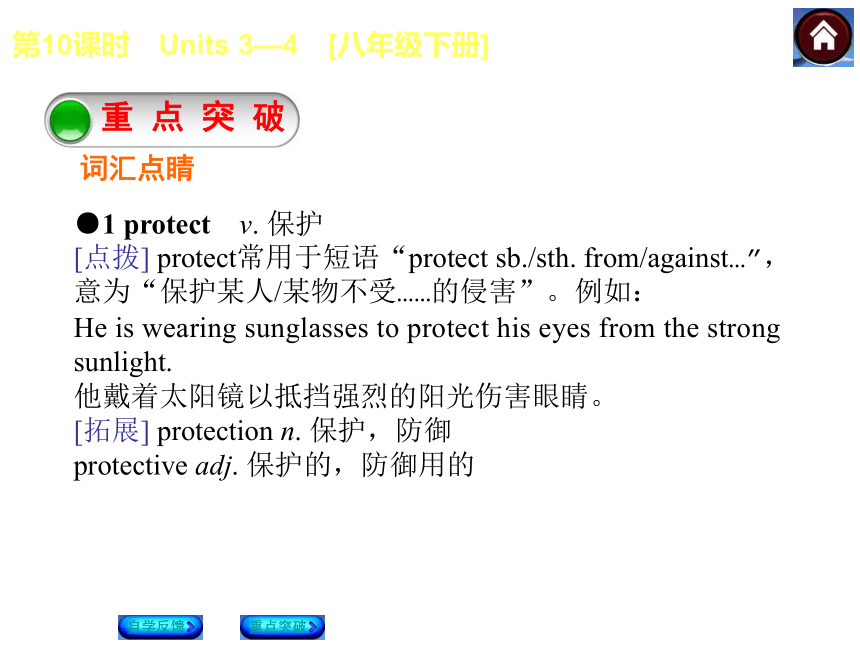
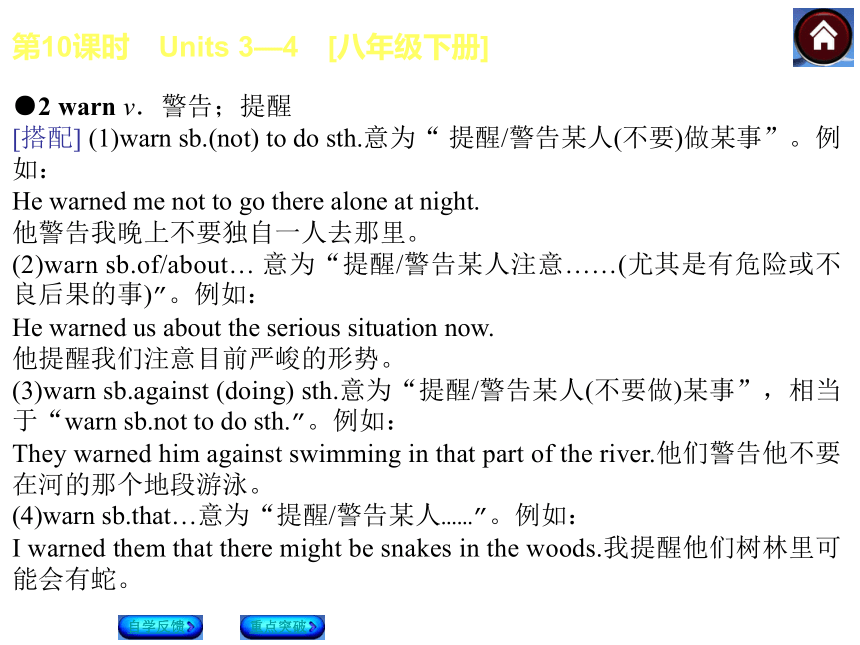
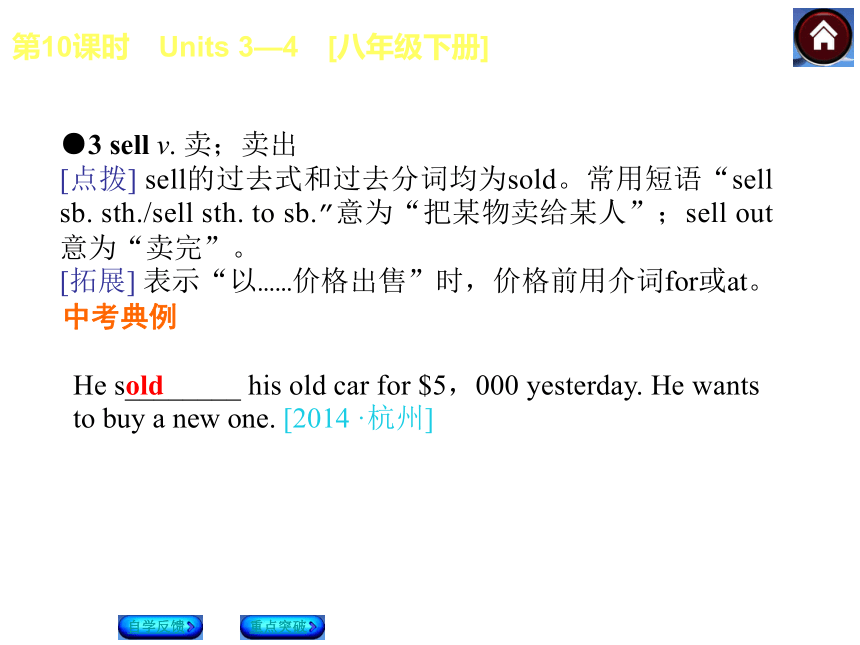
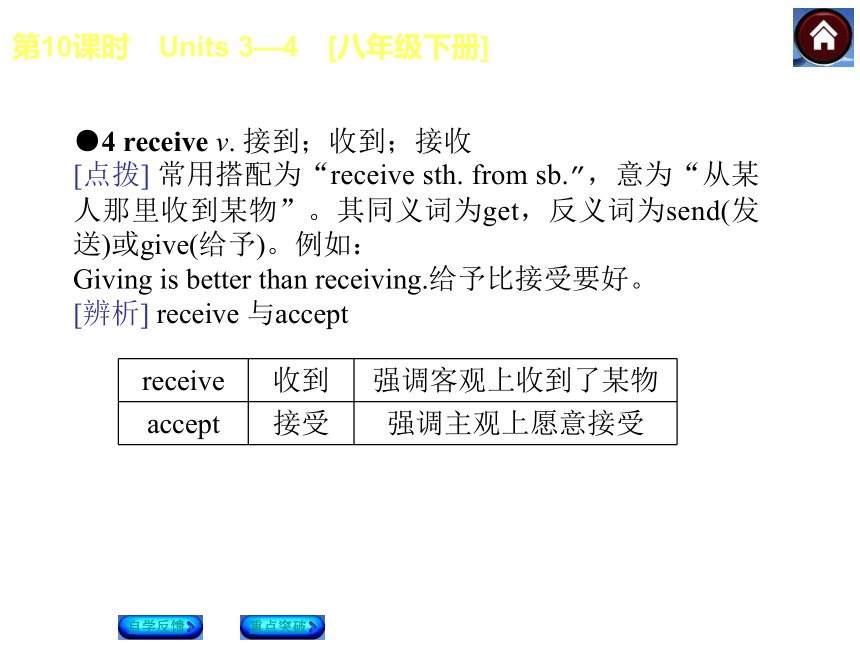
文档简介
课件34张PPT。 第10课时 Units 3—4 [八年级下册] 自 学 反 馈重 点 突 破第10课时 Units 3—4 [八年级下册]scaredlaidshookdangerousmicefoolishbuyinvite send/givedisadvantage第10课时 Units 3—4 [八年级下册]on a vacationinstead ofbe famous forwait a minutedrop toin dangeras welltouch one's heartby handdepend onkeep onpass onfar awaytake upset up a time第10课时 Units 3—4 [八年级下册]第10课时 Units 3—4 [八年级下册]hasn't been toinsteadremindsofAt the beginning ofthe number ofof第10课时 Units 3—4 [八年级下册]healthy bywork hardone of the biggest holidaystookto writewill complete第10课时 Units 3—4 [八年级下册]possible fortoSpending too muchable to connecthow to downloadsharereadis第10课时 Units 3—4 [八年级下册]第10课时 Units 3—4 [八年级下册]词汇点睛
●1 protect v. 保护
[点拨] protect常用于短语“protect sb./sth. from/against…”,意为“保护某人/某物不受……的侵害”。例如:
He is wearing sunglasses to protect his eyes from the strong sunlight.
他戴着太阳镜以抵挡强烈的阳光伤害眼睛。
[拓展] protection n. 保护,防御
protective adj. 保护的,防御用的
第10课时 Units 3—4 [八年级下册]
●2 warn v.警告;提醒
[搭配] (1)warn sb.(not) to do sth.意为“ 提醒/警告某人(不要)做某事”。例如:
He warned me not to go there alone at night.
他警告我晚上不要独自一人去那里。
(2)warn sb.of/about… 意为“提醒/警告某人注意……(尤其是有危险或不良后果的事)”。例如:
He warned us about the serious situation now.
他提醒我们注意目前严峻的形势。
(3)warn sb.against (doing) sth.意为“提醒/警告某人(不要做)某事”,相当于“warn sb.not to do sth.”。例如:
They warned him against swimming in that part of the river.他们警告他不要在河的那个地段游泳。
(4)warn sb.that…意为“提醒/警告某人……”。例如:
I warned them that there might be snakes in the woods.我提醒他们树林里可能会有蛇。
第10课时 Units 3—4 [八年级下册]●3 sell v. 卖;卖出
[点拨] sell的过去式和过去分词均为sold。常用短语“sell sb. sth./sell sth. to sb.”意为“把某物卖给某人”;sell out意为“卖完”。
[拓展] 表示“以……价格出售”时,价格前用介词for或at。
He s________ his old car for $5,000 yesterday. He wants to buy a new one. [2014·杭州] 中考典例old
第10课时 Units 3—4 [八年级下册]
●4 receive v. 接到;收到;接收
[点拨] 常用搭配为“receive sth. from sb.”,意为“从某人那里收到某物”。其同义词为get,反义词为send(发送)或give(给予)。例如:
Giving is better than receiving.给予比接受要好。
[辨析] receive 与accept
第10课时 Units 3—4 [八年级下册]
●5 cause v. 造成;引起
[点拨] cause的常见用法:
①cause sth.意为“造成某事,导致某事”。
②cause sb. sth.意为“给某人带来某事”。
③cause sb./sth. to do sth.意为“导致某人/物做某事”。
[拓展] cause还可以用作名词,意为“理由”时,通常用作不可数名词;意为“原因”时,通常用作可数名词,the cause of…意为“……的原因”。
第10课时 Units 3—4 [八年级下册]●6 depend on 依靠;取决于
[点拨] depend on为动词短语,也可以表示为depend upon,不能用于进行时态和被动语态。例如:
The price depends on the quality.价格视质量而定。—Are you going to Brazil to watch 2014 FIFA World Cup this summer?
—I'm not sure. It ________ time. [2014·东营]
A.depends on B.cares about C.agrees to D.finds out中考典例A第10课时 Units 3—4 [八年级下册]●1 some,any
some和any是表示不定数量的代词,意为“一些”,具有名词和形容词的性质,作形容词时,后面可接可数名词复数,也可接不可数名词。巧辩异同
第10课时 Units 3—4 [八年级下册]
Some of the girls are good at painting.
一些女孩擅长画画。
Lucy took some money to buy some books.
露西带上一些钱去买了几本书。
There aren't any tall buildings in the town.
这个城镇没有高大的建筑物。
Do you have any friends here?
你在这儿有一些朋友吗?
[提示] (1)在疑问句中,若说话人希望得到肯定的回答或表示请求、建议时,多用some而不用any。例如:
May I ask you some questions?
我可以问你一些问题吗?
第10课时 Units 3—4 [八年级下册] (2)if引导的条件状语从句中,多用any。例如:
If you have any question, please raise your hand.
如果你有任何问题,请举手。
(3)any也可用于肯定句中,修饰可数名词单数,表示“任何一个”。例如:
You can read any book you like.
你可以读你喜欢的任何一本书。
—Is there________ beef in the fridge?
—No, there isn't. There is ________ pork. [2014?天津]
A.some; any B.any; any
C.some; some D.any; some中考典例D
第10课时 Units 3—4 [八年级下册]●2 also, too, as well, either
第10课时 Units 3—4 [八年级下册]●3 hope, wish
第10课时 Units 3—4 [八年级下册]●1 He hasn't been to the zoo in Edmonton yet.
在埃德蒙顿他还没有去过动物园。
[点拨] have been to表示“某人曾经去过某地”,但现在已经回来了。例如:
He has been to America twice.他去过美国两次。
[拓展] (1)have gone to表示“某人到某地去了”,可能在途中,也可能到了那里,总之不在说话处。例如:
Mike isn't here.He has gone to America.
迈克不在这里。他去了美国。
(2)have been in+地点+for+一段时间,表示“某人在某地待了一段时间”。例如:
My sister has been in America for three years.
我姐姐在美国待了三年了。句型透视第10课时 Units 3—4 [八年级下册]—May I speak to Ann?
—Sorry, she isn't in. She ________ France. [2014·聊城]
A.has gone to B.has been to
C.was going to D.goes to中考典例A
第10课时 Units 3—4 [八年级下册]●2 The egret helps the rhino stay healthy by cleaning its skin.白鹭帮助犀牛通过清洁皮肤使它保持健康。
[点拨] by cleaning its skin是介词短语,在句中作方式状语,常用来回答由how引起的疑问句。by后可接名词或动名词(短语),此时意为“用/靠/通过……”,表示方式或途径。例如:
I learn English by listening to the radio. 我通过收音机学英语。
You can improve your English ________ practicing more. [2013·重庆]
A.by B.with C.of D.in中考典例A
第10课时 Units 3—4 [八年级下册]
●3 If I work hard this evening, I will complete my research.如果我今天晚上努力工作的话,我将完成我的研究。
[点拨] 本句为含if引导的条件状语从句的复合句。if引导的条件状语从句既可以放在主句之前,也可以放在主句之后。在以下三种情况下,if引导的条件状语从句用一般现在时代替将来时:
(1) 当主句用一般将来时态时;
(2) 当主句中含有情态动词时;
(3) 当主句为祈使句时。
例如: If it's fine tomorrow, they'll climb the hill.
如果明天天气好的话,他们将去爬山。
Please call him if you get there.
如果你到了那儿,请给他打电话。第10课时 Units 3—4 [八年级下册]—Can you guess if Mike ________ swimming this afternoon?
—I think he will go with us if he ________ free. [2014·凉山]
A.will go; is B.will go; will be
C.goes; is D.goes; will be中考典例A
第10课时 Units 3—4 [八年级下册]●4 It's one of the biggest holidays in many countries. 它是许多国家重大的节日之一。
[点拨] “one of+the(形容词最高级)+名词复数”结构表示“(最)……的……之一”,切记形容词后面的名词要用复数形式。
第10课时 Units 3—4 [八年级下册]Mo Yan is one of ________ wri-ters in the world. [2014·天津]
A.famous B.more famous
C.most famous D.the most famous中考典例D
第10课时 Units 3—4 [八年级下册]●5 I know how to download e-books online.
我知道如何在网上下载电子书。
[点拨] “疑问词+不定式”结构常用作宾语。这类简单句往往是由(含特殊疑问句变成的宾语从句的)复合句转化而成。例如:
I'm thinking about what to say. (=I'm thinking about what I should say.) 我在考虑说什么。
[拓展] 此结构还可作主语和表语。例如:
What to begin with hasn't been decided.
以什么开始还没有决定。(作主语)
Our problem is where to get the novel.
我们的问题是从哪儿得到这本小说。(作表语)
第10课时 Units 3—4 [八年级下册]—Excuse me. Could you please tell me ________ my car?
—Sure. Park it right here. I'll help you. [2014·龙东]
A.how to stop B.where to park
C.when to park中考典例B第10课时 Units 3—4 [八年级下册]1.You can improve your English ________ reading more. [2014·鞍山]
A.in B.with C.by D.of
2.If there ________ no buying and selling of animals, there will be no killing in nature. [2014·云南]
A.is B.will be C.has D.will have
CA
第10课时 Units 3—4 [八年级下册]3.David knows much about the city because he________there many times. [2014·南宁]
A.goes B.went C.has gone D.has been
D
第10课时 Units 3—4 [八年级下册]4.We are planning to go for a picnic this weekend, but it________ the weather. [2014·遂宁]
A.keeps on B.puts on C.depends on
5. “Food Safety” has become one of ________ topics recently. [2014·孝感]
A.hot B.hotter
C.hottest D.the hottest
CD
第10课时 Units 3—4 [八年级下册]6.They ________their clothes ________a good price.
A.sell; in B.sold; on C.sold; at D.sell; out
7.The song always reminds me ________our first date.
A.of B.about C.from D.to
8.The farmer covered all kinds of vegetables with plastic wrap to ________them from the cold.
A.prevent B.take
C.protect D.stop
CAC
第10课时 Units 3—4 [八年级下册]9.The zoo keepers warn visitors________close to the dangerous animals.
A.not getting B.getting not
C.not to get D.to not get
C
第10课时 Units 3—4 [八年级下册]10.By reading the article, we know ________ in our daily life.
A.how will we protect the earth
B.how to reduce pollution
C.when should we save water
D.when to waste things
B
●1 protect v. 保护
[点拨] protect常用于短语“protect sb./sth. from/against…”,意为“保护某人/某物不受……的侵害”。例如:
He is wearing sunglasses to protect his eyes from the strong sunlight.
他戴着太阳镜以抵挡强烈的阳光伤害眼睛。
[拓展] protection n. 保护,防御
protective adj. 保护的,防御用的
第10课时 Units 3—4 [八年级下册]
●2 warn v.警告;提醒
[搭配] (1)warn sb.(not) to do sth.意为“ 提醒/警告某人(不要)做某事”。例如:
He warned me not to go there alone at night.
他警告我晚上不要独自一人去那里。
(2)warn sb.of/about… 意为“提醒/警告某人注意……(尤其是有危险或不良后果的事)”。例如:
He warned us about the serious situation now.
他提醒我们注意目前严峻的形势。
(3)warn sb.against (doing) sth.意为“提醒/警告某人(不要做)某事”,相当于“warn sb.not to do sth.”。例如:
They warned him against swimming in that part of the river.他们警告他不要在河的那个地段游泳。
(4)warn sb.that…意为“提醒/警告某人……”。例如:
I warned them that there might be snakes in the woods.我提醒他们树林里可能会有蛇。
第10课时 Units 3—4 [八年级下册]●3 sell v. 卖;卖出
[点拨] sell的过去式和过去分词均为sold。常用短语“sell sb. sth./sell sth. to sb.”意为“把某物卖给某人”;sell out意为“卖完”。
[拓展] 表示“以……价格出售”时,价格前用介词for或at。
He s________ his old car for $5,000 yesterday. He wants to buy a new one. [2014·杭州] 中考典例old
第10课时 Units 3—4 [八年级下册]
●4 receive v. 接到;收到;接收
[点拨] 常用搭配为“receive sth. from sb.”,意为“从某人那里收到某物”。其同义词为get,反义词为send(发送)或give(给予)。例如:
Giving is better than receiving.给予比接受要好。
[辨析] receive 与accept
第10课时 Units 3—4 [八年级下册]
●5 cause v. 造成;引起
[点拨] cause的常见用法:
①cause sth.意为“造成某事,导致某事”。
②cause sb. sth.意为“给某人带来某事”。
③cause sb./sth. to do sth.意为“导致某人/物做某事”。
[拓展] cause还可以用作名词,意为“理由”时,通常用作不可数名词;意为“原因”时,通常用作可数名词,the cause of…意为“……的原因”。
第10课时 Units 3—4 [八年级下册]●6 depend on 依靠;取决于
[点拨] depend on为动词短语,也可以表示为depend upon,不能用于进行时态和被动语态。例如:
The price depends on the quality.价格视质量而定。—Are you going to Brazil to watch 2014 FIFA World Cup this summer?
—I'm not sure. It ________ time. [2014·东营]
A.depends on B.cares about C.agrees to D.finds out中考典例A第10课时 Units 3—4 [八年级下册]●1 some,any
some和any是表示不定数量的代词,意为“一些”,具有名词和形容词的性质,作形容词时,后面可接可数名词复数,也可接不可数名词。巧辩异同
第10课时 Units 3—4 [八年级下册]
Some of the girls are good at painting.
一些女孩擅长画画。
Lucy took some money to buy some books.
露西带上一些钱去买了几本书。
There aren't any tall buildings in the town.
这个城镇没有高大的建筑物。
Do you have any friends here?
你在这儿有一些朋友吗?
[提示] (1)在疑问句中,若说话人希望得到肯定的回答或表示请求、建议时,多用some而不用any。例如:
May I ask you some questions?
我可以问你一些问题吗?
第10课时 Units 3—4 [八年级下册] (2)if引导的条件状语从句中,多用any。例如:
If you have any question, please raise your hand.
如果你有任何问题,请举手。
(3)any也可用于肯定句中,修饰可数名词单数,表示“任何一个”。例如:
You can read any book you like.
你可以读你喜欢的任何一本书。
—Is there________ beef in the fridge?
—No, there isn't. There is ________ pork. [2014?天津]
A.some; any B.any; any
C.some; some D.any; some中考典例D
第10课时 Units 3—4 [八年级下册]●2 also, too, as well, either
第10课时 Units 3—4 [八年级下册]●3 hope, wish
第10课时 Units 3—4 [八年级下册]●1 He hasn't been to the zoo in Edmonton yet.
在埃德蒙顿他还没有去过动物园。
[点拨] have been to表示“某人曾经去过某地”,但现在已经回来了。例如:
He has been to America twice.他去过美国两次。
[拓展] (1)have gone to表示“某人到某地去了”,可能在途中,也可能到了那里,总之不在说话处。例如:
Mike isn't here.He has gone to America.
迈克不在这里。他去了美国。
(2)have been in+地点+for+一段时间,表示“某人在某地待了一段时间”。例如:
My sister has been in America for three years.
我姐姐在美国待了三年了。句型透视第10课时 Units 3—4 [八年级下册]—May I speak to Ann?
—Sorry, she isn't in. She ________ France. [2014·聊城]
A.has gone to B.has been to
C.was going to D.goes to中考典例A
第10课时 Units 3—4 [八年级下册]●2 The egret helps the rhino stay healthy by cleaning its skin.白鹭帮助犀牛通过清洁皮肤使它保持健康。
[点拨] by cleaning its skin是介词短语,在句中作方式状语,常用来回答由how引起的疑问句。by后可接名词或动名词(短语),此时意为“用/靠/通过……”,表示方式或途径。例如:
I learn English by listening to the radio. 我通过收音机学英语。
You can improve your English ________ practicing more. [2013·重庆]
A.by B.with C.of D.in中考典例A
第10课时 Units 3—4 [八年级下册]
●3 If I work hard this evening, I will complete my research.如果我今天晚上努力工作的话,我将完成我的研究。
[点拨] 本句为含if引导的条件状语从句的复合句。if引导的条件状语从句既可以放在主句之前,也可以放在主句之后。在以下三种情况下,if引导的条件状语从句用一般现在时代替将来时:
(1) 当主句用一般将来时态时;
(2) 当主句中含有情态动词时;
(3) 当主句为祈使句时。
例如: If it's fine tomorrow, they'll climb the hill.
如果明天天气好的话,他们将去爬山。
Please call him if you get there.
如果你到了那儿,请给他打电话。第10课时 Units 3—4 [八年级下册]—Can you guess if Mike ________ swimming this afternoon?
—I think he will go with us if he ________ free. [2014·凉山]
A.will go; is B.will go; will be
C.goes; is D.goes; will be中考典例A
第10课时 Units 3—4 [八年级下册]●4 It's one of the biggest holidays in many countries. 它是许多国家重大的节日之一。
[点拨] “one of+the(形容词最高级)+名词复数”结构表示“(最)……的……之一”,切记形容词后面的名词要用复数形式。
第10课时 Units 3—4 [八年级下册]Mo Yan is one of ________ wri-ters in the world. [2014·天津]
A.famous B.more famous
C.most famous D.the most famous中考典例D
第10课时 Units 3—4 [八年级下册]●5 I know how to download e-books online.
我知道如何在网上下载电子书。
[点拨] “疑问词+不定式”结构常用作宾语。这类简单句往往是由(含特殊疑问句变成的宾语从句的)复合句转化而成。例如:
I'm thinking about what to say. (=I'm thinking about what I should say.) 我在考虑说什么。
[拓展] 此结构还可作主语和表语。例如:
What to begin with hasn't been decided.
以什么开始还没有决定。(作主语)
Our problem is where to get the novel.
我们的问题是从哪儿得到这本小说。(作表语)
第10课时 Units 3—4 [八年级下册]—Excuse me. Could you please tell me ________ my car?
—Sure. Park it right here. I'll help you. [2014·龙东]
A.how to stop B.where to park
C.when to park中考典例B第10课时 Units 3—4 [八年级下册]1.You can improve your English ________ reading more. [2014·鞍山]
A.in B.with C.by D.of
2.If there ________ no buying and selling of animals, there will be no killing in nature. [2014·云南]
A.is B.will be C.has D.will have
CA
第10课时 Units 3—4 [八年级下册]3.David knows much about the city because he________there many times. [2014·南宁]
A.goes B.went C.has gone D.has been
D
第10课时 Units 3—4 [八年级下册]4.We are planning to go for a picnic this weekend, but it________ the weather. [2014·遂宁]
A.keeps on B.puts on C.depends on
5. “Food Safety” has become one of ________ topics recently. [2014·孝感]
A.hot B.hotter
C.hottest D.the hottest
CD
第10课时 Units 3—4 [八年级下册]6.They ________their clothes ________a good price.
A.sell; in B.sold; on C.sold; at D.sell; out
7.The song always reminds me ________our first date.
A.of B.about C.from D.to
8.The farmer covered all kinds of vegetables with plastic wrap to ________them from the cold.
A.prevent B.take
C.protect D.stop
CAC
第10课时 Units 3—4 [八年级下册]9.The zoo keepers warn visitors________close to the dangerous animals.
A.not getting B.getting not
C.not to get D.to not get
C
第10课时 Units 3—4 [八年级下册]10.By reading the article, we know ________ in our daily life.
A.how will we protect the earth
B.how to reduce pollution
C.when should we save water
D.when to waste things
B
